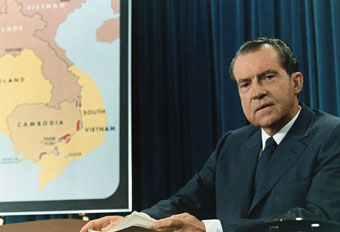

Book Review by R. Alan Clanton
Thursday Review Editor
It has been repeated so often over the last 60 years that it became the late 20th Century’s great American political cliché: U.S. military intervention in the internal struggles and civil wars of other nations is a slippery slope. The lessons of Vietnam were meant to be the lessons of all future wars—from Granada to Panama, from the Balkans to Somalia to Desert Storm, from Iraq to Afghanistan. In the case of U.S. involvement in Southeast Asia, the historical image of an increasingly deadly poker game—each player raising the stakes in an attempt to frighten and bluff the other away from the table, or back to the table—seems reasonable and valid. Thus Richard Nixon, as President, could in fairness deflect blame to his predecessors for the mess he inherited upon his arrival to the White House in January 1969. American involvement in Indo-China and specifically in Vietnam could be traced back to the end of World War II, and, more clearly, to the French defeat at Dien Bien Phu, with Presidents Eisenhower, Kennedy and Johnson all raising the stakes—more advisors, more troops, more CIA involvement, followed by still more troops, more firepower, more deaths—the entire spiral punctuated by brief interludes of ceasefire and fruitless talks.
Jeffrey Kimball’s book, Nixon’s Vietnam War (University Press of Kansas), takes us deeply into the thought processes and backchannel machinations of Richard Nixon, arguably one of the greatest foreign policy chief executives in U.S. history, but also a president narcisistically and single-mindedly protective of his historical legacy. Nixon had watched as his predecessor, Lyndon Johnson, allowed Vietnam to undermine vast social and sweeping political agendas, dividing the Democratic Party and very nearly destroying the party of FDR and Kennedy. The Gordian knot that was Vietnam ruined Johnson, and Nixon was determined to avoid that fate.
Be warned: Kimball is no friend nor apologist of Nixon. The book is unsparing and unblinking, and is written largely as an assault on the one formidably potent part of the Nixon legacy left standing after Watergate—that of Nixon as savvy master of foreign policy. Well-researched and well-written, Kimball makes the case, through detailed analysis of Nixon’s papers, letters, telegrams, cables and recorded conversations, as well as extensive interviews with those who worked with the president, that Nixon was willing to escalate the military operations in Southeast Asia to a new and frightening level of violence in order to coerce Ho Chi Minh and the North Vietnamese into productive talks. Kimball also illustrates the complex relationship between Nixon and his closest internationalist advisor, Henry Kissinger—a partnership of towering egos which produced game-changing improvements in U.S. relations with the Soviet Union and the People’s Republic of China, but a collaboration unable to bring about constructive progress toward peace in Vietnam without heavy escalation and further bloodshed, including U.S. forays deep into Cambodia and massive bombing operations.
Kimball’s dispassionate and erudite tone keeps the story focused—and readable. For those, however, willing to view Nixon and his presidency as a complex, Homerian epic of noble skill and fatal hubris, Kimball offers little shelter: Nixon and Kissinger were masterful only in their darkest Machiavellian machinations.
Kimball’s book is an appropriate study for those looking at the Nixon birthdate centennial. And this is clearly not for the light reader, but in the current context of Afghanistan and Iraq, it is a valuable resource for both liberals and conservatives, hawks and doves, in developing a full understanding of how, as Americans, we go to war…and, in the end, how we assign blame for failure or success.
Photo courtesy of Richard Nixon Library & Archives